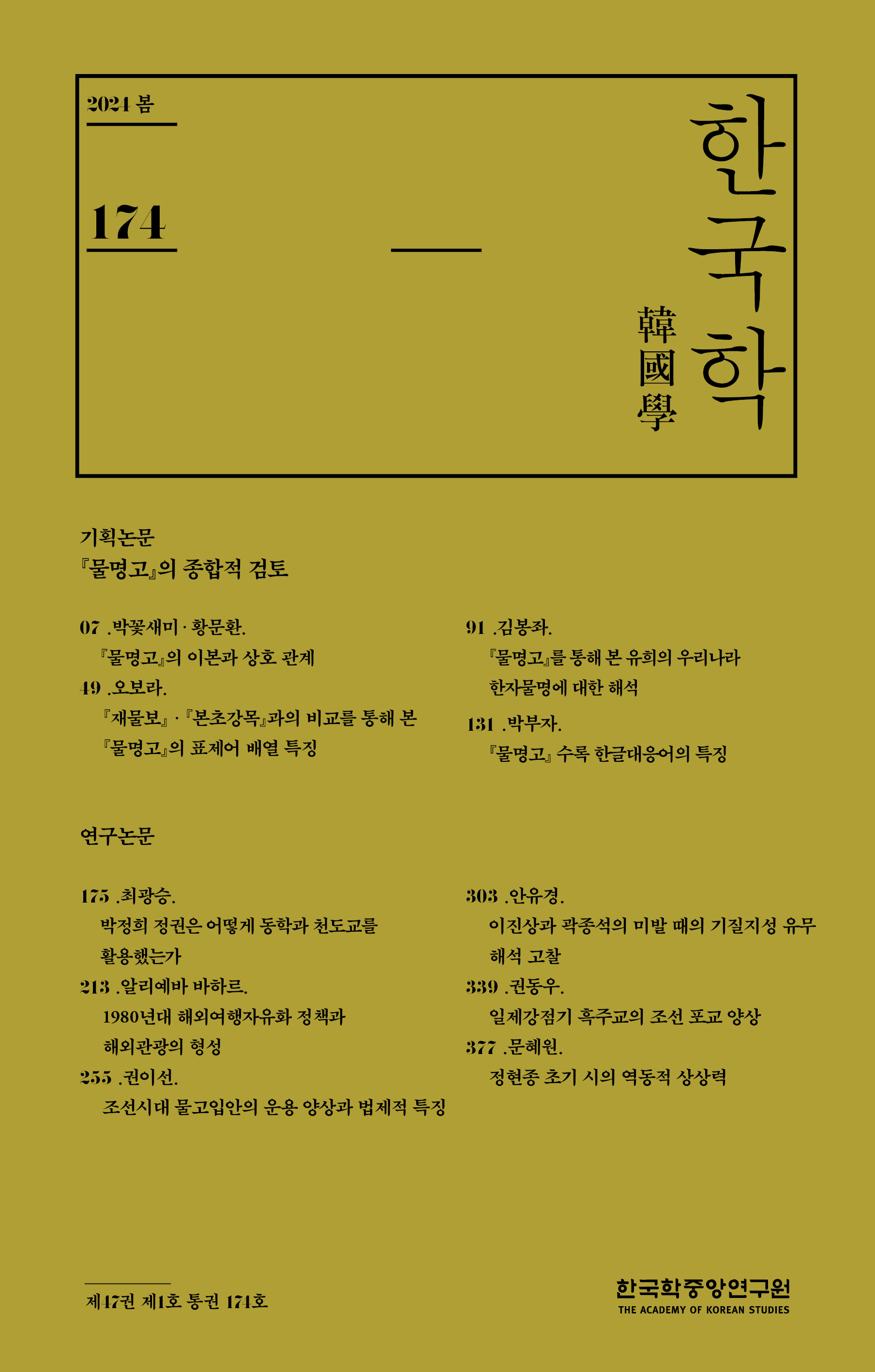
- P-ISSN 2671-8197
- E-ISSN 2733-936X
.jpg)
This paper tries to reconstruct the development of Jujagarye in the middle Chosun period. In the early Chosun, Jujagarye emphasized the practice in a daily life, but in the middle period, it brought about the theoretical research and political debates due to the production of many books on sacrificial rites. This change was based on the intensification of Confucian theory by the party of Sarim and the flourishing of Yehak(Thoughts on Ri[Rites]). The arguments of sacrificial rites in this period dynamically show the settlement of practicing the Confucian ancestor worship, telling that there were conflicting ideas in the process of establishing the general decorum. The purport of ancestor worship was to reflect on the fundamental meaning of life through the intimate relationship with the ancestor, but the ritual activities were constructed in diverse network of social powers, such status and gender. The discourses on sacrificial rites contain the reorganization of human relationship by the Confucian patriarchy seeking for the legitimate line of descent and the rights of primogeniture.
고영진, (1995) 조선 중기 예학사상사, 한길사
권오봉, (1989) 變禮에 관한 퇴계선생의 禮講,
김경숙, (2000) 16세기 사대부 집안의 제사설행과 그 성격,
김동노, (2004) 유교의 예와 미시적 권력관계 , 서울 청계
김문준, (2005) 17세기 典禮問題에 대한 權의 예론과 그 의의, 한국사상과 문화
김미영, (2005) 조상제사의 실질적 주체.제사와 제례문화., 안동: 한국국학진흥원
김윤정, (2002) 朝鮮中期 祭祀承繼와 兄亡弟及의 변화, 조선시대사학보
한국국학진흥원 교육연수실 , (2005) 제사와 제례문화, 안동: 한국국학진흥원
도민재, (2002) 社會變化에 따른 祭禮의 諸問題, 유교사상문화연구
두경자, (1999) 가사노동과 가계경제를 중심으로 본 조선조 제례연구, 상명대학교 사회과학연구소
마르티나 도이힐러, (2003) 한국사회의 유교적 변환, 아카넷
마크피터슨, (2000) 儒敎社會의 創出, 서울: 일지각
문옥표, (1998) 禮書에 나타난 유교식 관혼상제례의 의미분석 , 집문당
박미해, (1999) 17세기 양자의 제사상속과 재산상속, 한국사회학회
박연호, (1990) 조선전기 士大夫禮의 변화양상 가례와 宗子法을 중심으로,
배상현, (1991) 조선조 기호학파의 예학사상연구 송익필김장생송시열을 중심으로,
배영동, (2005) 제사와 공동체 제사와 제례문화, 안동: 한국국학진흥원
유권종, (2005) 제사의 종류와 그 의례적 특징 제사와 제례문화, 안동: 한국국학진흥원
유권종, (2000) 유교의 종교적 역할, 중앙대 철학연구소
유정동, (1978) 예송의 제 학파와 그 논쟁 한국철학사연구,
이성무, (1992) 17世紀의 禮論과 黨爭 조선 후기 당쟁의 종합적 검토 한국정신문화연구원,
이욱, (2002) 제사의 종교적 의미에 대한 고찰, 유교사상문화연구
이재룡, (1995) 조선 예의 사상에서 법의 통치까지, 예문서원
임민혁, (2000) 朱子家禮를 통해 본 朝鮮의 禮治,
장철수, (1995) 한국의 冠婚喪祭, 집문당
정일균, (2001) 주자가례와 ‘禮의 情神’,
정긍식, (2001) 조선전기 朱子家禮의 수용과 祭祀繼承 관념, 한국역사민속학회
정긍식, (2004) 16세기 財産相續과 祭祀繼承의 실태,
한국정신문화연구원, (2000) 朝鮮時代 冠婚喪祭(V). , 성남: 한국정신문화연구원